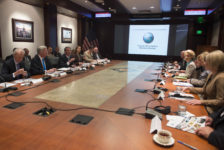Summary of Nov 16 NSF presentation by Ted Morse on….
“ISIS AFTER IT IS MILITARILY DEFEATED”
Ted Morse retired from the Foreign Service after more than 37 years of service, much of those in Moslem countries in Asia and Africa. He did two tours in Iraq during the overthrow of Saddam, as CPA Coordinator and Mayor of Baghdad. He has over 50 years experience in conflict-ridden areas of the world!
His presentation postulated that ISIS would be militarily defeated in Mosul and Raqqa, but would continue to be a real terrorist threat to the world, including the US. Morse postulated that ISIS will morph into a very active guerrilla organization in terrorist pursuit of jihad, even after it loses its political and geographical bases of the declared Caliphate.
Major Concerns Regarding the Region
After ISIS is Defeated
Morse presented three concerns about the post-Mosul defeat of ISIS. First, there is no agreement in the battle plan on how the multi-ethnic, second largest city in Iraq would be governed following the expulsion of ISIS. This is because of sharp differences among the 19 sectarian and non-sectarian parties participating in the Mosul battle, who likely will stay to aggressively pursue their own specific agendas. Second, there are few provisions for re-settling 500,000 refugees and internally placed people once the battle is over, leading to their disillusionment with the replacement of ISIS. Third, ISIS is already disbursing hundreds of followers throughout Iraq to undermine the Shia-led government, and to demonstrate their continued strong commitment to renewed terrorism. These destabilizing conditions will leave openings for ISIS to mount continuing violent terrorism in Iraq and Syria.
Similar conditions will prevail after ISIS is defeated in Raqqa. This will be complicated by the likelihood that thousands of ISIS remnants will join the Sunni based rebels fighting Assad’s government, including the al-Qaeda affiliate, Al Nusra. This will confront the new American administration with tough Foreign Policy and Security decisions: Does the US-led 62 nation Coalition join Syria, Russia and Iran in fighting these integrated rebels, to further degrade ISIS’s capability to conduct worldwide terrorism? Or does the US and the coalition support the integrated rebels against Assad, thus risking all out war with Syria and its supporters? Or do we withdraw believing that the US has no over-riding national security interests in Syria once ISIS is defeated militarily?
ISIS will have the intent and capability to aggressively continue worldwide radical Islamic terrorism, and will be even fiercer as it competes with al-Qaeda for international jihad leadership. ISIS will call on its 33-40 worldwide affiliates to join this crusade. On the eve of the Mosul and Raqqa battles, in his first public pronouncement in almost a year, ISIS leader al-Baghdadi has called for this uprising, especially for “home grown” terrorists to attack in Europe and America.
This is the imminent threat even after ISIS is defeated militarily. From decentralized underground locations, it will exploit the social media (use of which it has perfected) to inspire and direct international terrorism in pursuit of its commitment to the goal of reestablishing a Caliphate governed by the strictest interpretation of the Koran. American security leaders have recognized this threat and have successfully responded with improvements in intelligence, technology, partnerships and community outreach. Recent terrorist incidents and political rhetoric have fueled fear among 62% of polled Americans (Pew Research). The reality is there have only been eleven radical Islamic terrorist attacks in America since 9/11. These have all been by radicalized Americans. Inasmuch as there are more than sixty thousand American deaths per year from automobile accidents and suicides, this fear of Islamic terrorism does not seem to be based on reality.
Terrorism is the “ism” of this generation and will be with us for decades unless several challenges are addressed:
- First, ISIS and its affiliates must be annihilated by international, multiple approaches wherever they are located.
- The 1.3-1.4 billion Moslems in the world must unite to continually delegitimize ISIS as not representing their religion. Over the longer term, Islamic leaders must undertake a reformation to relate their religion to 21st century life to replace reliance on centuries’ old interpretations.
- We Americans must improve understandings to respect diversity, to be more inclusive not exclusive, to support community and family outreach to Americans vulnerable to ISIS propaganda. We should draw on the Abrahamic values instilled in Judaism, Christianity and Islam to defeat radical Islamic terrorists like ISIS and al-Qaeda.
The link to Ted Morse’s PowerPoint is below.
Morse also suggests NSF participants might read this piece which came out right after his talk:
Baghdad, Kurds at odds over control of post-ISIL Mosul – News from Al Jazeera


